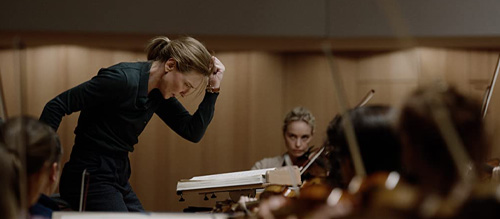Tár (2022) Review

Tár (2022)
Director: Todd Field
Screenwriter: Todd Field
Starring: Cate Blanchett, Noémie Merlant, Nina Hoss, Sophie Kauer, Mark Strong
There is something of a European sensibility to Todd Field’s long-awaited return to the director’s chair, Tár (2022); a hint of Ruben Östlund in its tightly weaved story elements and profound use of epilogue, a touch of Thomas Vinterburg in its sense of immersion and its intention to explore the parts of human behaviour not often discussed and rarely presented. Sixteen years out of the director’s chair seem to have served this one-time would-be prodigy with some noble intent, Tár being a thoughtful rumination on art, on celebrity, and particularly upon cancel culture. This isn’t the dopamine spiking, righteously angry movie that fellow narratives about problematic figures have been in recent years, namely She Said and Bombshell, it’s more of a nuanced and inquisitive exploration of the people and circumstances entwined in such situations, a film that foregoes the more Hollywoodised notion that one side is declared the winner and therefore all these problems can be chalked off as “dealt with”.
As was the case with his previous directorial effort Little Children (2006), in which a suburban community was dissected in the midst of a convicted paedophile moving into the area, writer-director Todd Field challenges himself to earning empathy for and asking questions about another detestable figure, Lydia Tár; a world-renowned composer addressed as “Maestro”, the first female director of a major German orchestra. She is egotistical, assured, wholly removed from the concerns of the every day and the everyone, and so used to getting exactly what she wants how she wants it that she seems incapable of confronting the truths that lay before her, deluded by her own talent.
It’s all very familiar.
So much of the world’s news in recent years has been written about egomaniacs, abusers, and bullies, and so little about the constructs that attract and encourage such monstrosity to flourish in art and entertainment. Todd Field seems interested in that. Like a good psychologist, Field doesn’t try to prove any pre-existing idea, he lets the data form his idea. In Tár, we bear witness to that process, and as a result there is no blame pointed at crooked and dehumanising personality traits nor directly at the practices of industries or the constructs that support them. Instead, there are facets to each, Field’s presentation being a mature and in-progress deconstruction of what causes someone to be cancelled, a film that asks “why do we choose to cancel certain people?”
Cate Blanchett’s work is so fantastically strong when it needs to be, her performance so estranged from her usual self that even the rhythm of her own communication is disrupted, her breathing changed. This isn’t the Blanchett of Don’t Look Up, it’s a new beast entirely, a once-in-a-career performance from a generational talent. Blanchett is so assured that the colours of her character simply pop from the screen at the slightest alteration in behaviour; hers is a performance so rich that she is both hugely sympathetic and wholly detestable. She is even credited with conducting each of the orchestras herself and for playing (and singing) her own music throughout – an element of the process that will not be lost on awards voters. Together with her writer-director, Blanchett forms a character so believable she has convinced many that she must be based on a real person; she was simply born to play the part.

Field crucially constructed Tár as an intimate character study first and foremost, which allows for Blanchett to excel in long scenes filled with dialogue. Almost every sequence has a two-minute (or more) take, allowing for the artistry of the actors – the cast of which also includes Portrait of a Lady on Fire star Noémie Merlant offering a withdrawn performance as an under pressure assistant with greater aspirations – to really bleed into the words on the page, to enhance the experience. Everything here is believable to the extent that Blanchett’s performance is; there are no egregious moments or convenient plot developments.
There is a lot to be said for the problematic nature of sympathising with the devil, and there is no doubt that in doing so Tár will be off-putting to many people, but this is cinema that reaches beyond the standardised black and white presentation of good and evil. This is a film that requires us to be carried away by the charisma of this larger than life personality we see before us, and for us to journey with her as her layers of bravado are stripped back until she is no different to you and I. This is a film about now, this moment, the era in which art and artist cannot be separated; a pointed question about why we decide that the histories of some artists should be deemed useful in re-evaluating their work and why the histories of others matter little.
What Todd Field has accomplished with this, only his third feature directorial effort, is an enticing presentation of unravelling comeuppance and the effects this has on artists, on their art, on our reception of that art, and on our culture in a wider context – what does cancelling somebody say about us? It does so through beautiful photography (some of which captures Berlin, Germany with such vibrancy and class), an open-minded and mature approach to complex and contextually relevant topics, and a once-in-a-lifetime lead performance that pushes the film’s dramatic sensibilities into the stratosphere. Tár is exceptionally well constructed, an art piece as relevant as any from the past five years, an unmissable cinema experience.
Score: 20/24

